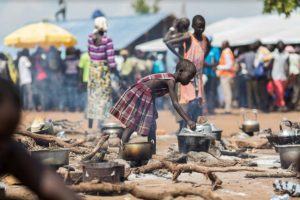Why Sudanese refugees may not go back home even when peace is restored


Kampala, Uganda | THE INDEPENDENT | Sudanese refugees in Uganda and other countries are worried that even when peace returns to their homes, they might not be able to go back.
This is because, according to studies, there are sustained efforts by powers there to confiscate the land they occupied before the conflicts, especially the 2003 chaos that hit the Darfur region in the west of the country and parts of Kordofan in the south-central.
The conflicts have left most of the 11 million Darfur population displaced, with between 300,000 and 700,000 people dead, either killed in the fighting or through starvation.
Today it is estimated that 300,000 people from Darfur are refugees in neighbouring countries including Between 45,000 and 70,000 in Uganda.
These are not part of the current fighting between the Rapid Support Forces militia and the government army, which itself has resulted in more than 2 million refugees.
Civil society and experts say the real numbers may never be got because of the decades-long instability, with no proper administrative structures.
Studies by expert panels, civil society and the media from the region tell of a seemingly coordinated plan to take over the land of the Indigenous Dafurians who have been killed or forced into internally displaced people’s camps (IDP) or out-of-the-country over the last 20 years.
The reports released courtesy of Freedom House, a pro-peace and democracy charity based in the USA, and Salaa Media Centre, show that the results of the Janjaweed militia campaign backed by the then Omar Al Bashir Government against the mainly black Sudanese have been worsened by the current conflict between the government forces and its allies on one hand and the Rapid Support Forces (RSF) on the other.
Dr Mahmoud Adam Daoud, Associate Professor at the University of Nyala in Darfur, thinks that the conflict that has seen more than 4 million people off their land, is basically a land conflict, with perpetrators having Government support.
The War in Darfur also nicknamed the Land Cruiser War, has been termed a genocide by some, including the USA, but there has been little effort by the international community to intervene.
Unfortunately, the situation is made worse by the apparent absence of a recognisable government.
This is the reason Dr Abbas Eltegani, the President of Salaa Media says they are calling for the exposure of the plight of the people in Darfur since they are not even sure of what government in Sudan to petition.
In another development related to the warring factions, there is fear for the environment, arising from abandoned explosives like land mines, but also uncontrolled mining activities.
The reports accuse the RSF of invading mineral-rich areas in Darfur, especially for gold and mining without any regard for the environment.
According to the reports, the chemicals used in mining, as well as mineral waste are being dumped in rivers and other water sources, posing risks to the population that rely on the water, according to Mohamed Saadalla.
The war was sparked off in February 2003 when the Sudan Liberation Movement (SLM) and the Justice and Equality Movement (JEM) rebel groups began fighting against the Al Bashir Government which they accused of oppressing Darfur’s non-Arab population.
The government responded by carrying out what has been termed a campaign of ethnic cleansing against the indigenous black populations, leading to the indictment of President al-Bashir, for genocide, war crimes, and crimes against humanity by the International Criminal Court.
Most of the refugees are in Chad and Egypt, as well as in Ethiopia, Central African Republic and South Sudan.
*****
URN
The post Why Sudanese refugees may not go back home even when peace is restored appeared first on The Independent Uganda:.






